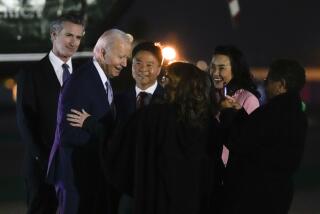President Pursues His Domestic Agenda
- Share via
BEDFORD, Mass. — The message from the White House these days is, war or not, the business of the republic must continue. On Friday, it was conducted over rack of lamb.
As the air war in the Balkans moved toward its fourth week, White House officials decided President Clinton could not ignore his domestic agenda--including political fund-raising.
“Domestic business goes on,” White House Press Secretary Joe Lockhart said recently. “One of the things that any president does . . . is, as a leader of the party, [he] participates in party politics.”
So there was a luncheon in Dearborn, Mich., a dinner in the tony Boston suburb of Weston and a collection plate that filled by the end of the day with $1.2 million for the campaigns to elect Democratic majorities in the Senate and House next year.
Hoping to avoid any appearance that Clinton was insensitive to the war and its victims, the White House made sure the No. 1 topic of the day remained Kosovo.
In Michigan, the president met with a group of Albanian Americans, hearing from them accounts of the troubles faced by refugees from Kosovo, with the parents of Staff Sgt. Christopher J. Stone of Smiths Creek, Mich., who is one of three American soldiers held captive in Serbia, and with about 50 reservists on their way to Europe to support aerial refueling operations.
At Hanscom Air Force Base here, he gave an abbreviated pep talk to military personnel and their families.
Speaking in Roseville, Mich., the heart of a Detroit-anchored community of 40,000 Albanian Americans, Clinton renewed his pitch for a post-war program of aid for the Balkans akin to the massive Marshall Plan that helped rebuild Western Europe after World War II and the assistance the United States directed at Poland, Hungary and other once-communist nations of Eastern Europe after the end of the Cold War.
At the fund-raising events, Clinton acknowledged right from the start the odd and uneasy confluence of the day.
“Because of the operation going on in Kosovo--and I know that all Americans are proud of what our young people in uniform are doing there--it is an unusual moment for me to be here,” the president said upon being introduced at the Michigan luncheon.
“What’s all this got to do with what we’re doing in Kosovo?” he asked. His answer: The world of the 21st century must be “free of this sort of madness--of [people] hating each other because of their differences.”
“That is what is at stake,” he said. “And that’s why it’s good that we’re all here today. Because in the end, the political leadership of the country cannot go where the people will not travel. . . . It matters which candidates you support.”
The question of when, and to what degree, Clinton could return to politics and other domestic topics has troubled the White House staff since the campaign over Kosovo began.
He spoke at two Democratic fund-raisers in Washington on March 23. Bombs began falling the next day. With little debate, the White House canceled a fund-raising trip to Nevada and California scheduled for the following weekend.
But increasingly, the president is speaking out on such domestic matters as his so-called USA Accounts retirement savings proposal and his plan to protect patients’ rights in dealing with health maintenance organizations.
“The president has a very aggressive domestic agenda and he’s not going to let Slobodan Milosevic and the barbarisms he’s perpetrated in Kosovo sidetrack him,” Lockhart said.
In juggling Clinton’s public and private schedule, his aides have kept in mind the lesson learned by other presidents.
President Carter became a captive of a crisis when Americans were taken hostage in Tehran in November 1979. Carter canceled all presidential travel out of the Washington area for nearly half a year.
President Bush began the military buildup in Saudi Arabia that preceded the Persian Gulf War, and then headed out into the Atlantic Ocean in his cigarette boat while on vacation in Kennebunkport, Maine. In the end, it mattered not a bit politically, but it placed him on the defensive in the initial weeks of the crisis after Iraq’s invasion of Kuwait in August 1991.
Five days after the air campaign began in the Balkans, Clinton polled his staff on the political wisdom of taking the afternoon off to play golf--and decided the personal benefits of relaxation and fresh air would overcome the inevitable criticism.
Now, with every expectation that the war will continue perhaps into the summer, Clinton and his staff are trying to return to a routine that lets him track the military campaign, maintain pressure on Congress to tackle looming problems facing Medicare and Social Security, and not withdraw his arm stretched out for political dollars.
More to Read
Get the L.A. Times Politics newsletter
Deeply reported insights into legislation, politics and policy from Sacramento, Washington and beyond. In your inbox twice per week.
You may occasionally receive promotional content from the Los Angeles Times.









